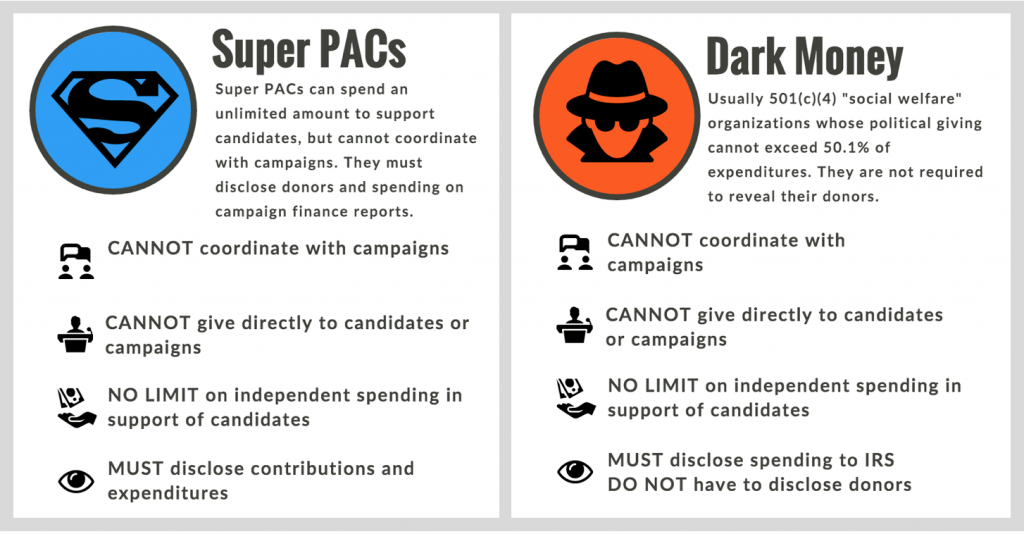Has someone asked Senator Whitehouse his thoughts on ‘dark money’ by his own party?
Or this? Big Labor is among the most prolific political spenders in U.S. politics: From 2012 to 2014, America’s largest unions sent nearly $420 million to the Democratic Party and closely aligned special interest groups. The Democratic Governors Association raked in almost $8 million during that time, while Catalist—a premier Democratic data firm—made off with more than $5 million. (And that $420 million number doesn’t even include millions of dollars in candidate contributions from PAC money.)
Unions sent member dues money to an array of “dark money” liberal advocacy groups including the 501(c)(4) arms of the Center for American Progress, National Employment Law Project, and Partnership for Working Families—which aren’t required to report who funds them. George Soros’ Democracy Alliance—a secretive network of liberal donors—received more than $2 million during those years. And who are these donors? It’s not clear: According to The Washington Post, the group “does not disclose its members.”
*** Public Integrity did some amazing research found below with an extraordinary summary.
How Democrats use ‘dark money’ — and win elections
Alabama’s special election is a case study in liberals’ furtive affair with secret cash
Democrats love decrying “dark money” — political contributions for which the source of funds is a mystery. But that isn’t stopping them from accepting “dark money” themselves or making it difficult to determine the original underwriter of a political donation, as a recent Southern contest vividly illustrates.
Alabama’s special U.S. Senate election in December is a case study in the lengths national Democrats, who this year are racing to win back Congress from Republicans, are willing to go to hide their cash in the name of political expediency.
Here’s what happened: When it seemed as if Democrat Doug Jones could actually beat embattled Republican Roy Moore, a new super PAC supposedly based in Birmingham, Alabama, appeared just one month before Election Day. The super PAC, called Highway 31 after a route that bisects Alabama, spent $5.1 million to boost Jones, more than any other group active in the general election.
Using a little-known legal loophole that allows political committees to do business on credit, the super PAC didn’t disclose the identities of its bankrollers until a month after voters chose Jones as their senator. And when Highway 31 did disclose, most of its funders turned out to be organizations who in turn receive some of their funding from sources that are difficult, if not impossible, to comprehensively trace to flesh-and-blood humans.
Highway 31 wasn’t exactly a homegrown group, either. All but about $10,000 of the $4.4 million the super PAC raised came from three national-level, Democratic-aligned entities: $3.2 million from super PAC Senate Majority PAC, $910,000 from the super PAC Priorities USA Action and $250,000 from the nonprofit League of Conservation Voters Inc.
Those millions allowed Highway 31 to relentlessly skewer Moore over accusations he molested children and helped propel Jones to an improbable victory in one of the nation’s most conservative states. Adam Muhlendorf, an Alabama communications consultant who led Highway 31, did not respond to requests for comment. Back in December, he told the Center for Public Integrity that the super PAC followed “every appropriate rule and regulation.”
Donors to the donors of the donors
So who funds Highway 31’s funders?
Senate Majority PAC’s biggest donations come from a handful of active billionaires: Newsweb Corp.’s Fred Eychaner with $2 million, Paloma Partners’ Donald Sussman with $1.5 million and billionaire businessman George Soros with $1 million. The super PAC’s donor list also includes pages and pages of comparatively small donations, and it boasts of how unambiguous its operations are.
“Running transparent, low-overhead, take-no-prisoners independent campaigns, we defend Democrats from Republican attacks, aggressively contest open Senate seats, and go after Republicans on their own turf,” reads the website of the super PAC, which former aides to then-Sen. Harry Reid, D-Nev., created in 2011 to compete with a network of Republican groups engineered by Republican political consultant Karl Rove.
But in 2017, at least $7.5 million of Senate Majority PAC’s funds came from labor unions, other super PACs and “social welfare” nonprofit groups. The Supreme Court’s 2010 decision in Citizens United v. Federal Election Commission allowed such entities to spend unlimited amounts of money to advocate for and against politicians and gave rise to super PACs, which in turn may accept unlimited contributions from them.

